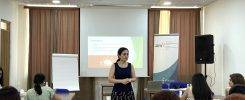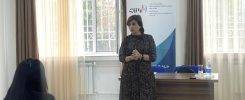“EACH LEARNER IS UNIQUE AND EQUALLY IMPORTANT”
The principles of inclusion and equity imply not only providing access to education, but also quality learning spaces and effective pedagogical methods that will enable all students to develop, perceive reality, and realize their skills. Various researches conducted by various organizations in the Republic of Armenia, as well as the results of ongoing monitoring by the RA MoESCS Republican Pedagogical-Psychological Center, prove that children who need 3rd and 4th-degree support, although they are registered in schools, most of them do not attend school it and, accordingly, their right to education is not fully realized. A homeschooling approach also isolates children and deprives them of the benefits of socialization in a school environment.
The Republican Pedagogical-Psychological Center in cooperation with UNICEF Armenia and the Perkins School for the Blind is implementing a pilot program “Resource-Classroom”, which is aimed at students with mental (intellectual) problems in mainstream schools of Armenia, which is aimed at the realization of the right to education of children with SEN due to mental (intellectual) problems studying in general educational institutions of the Republic of Armenia, including homeschooling and those who need 3rd and 4th level support of pedagogical and psychological services.
The current pilot program offers comprehensive support based on the diverse needs of children in need of support at levels 3rd and 4th, helping them to succeed in the mainstream classes in which they are registered as students. Involvement of these students in their mainstream classes can be done gradually, bringing it to the maximum level possible for that particular student. So, a curriculum is developed for each resource classroom involved in this program, the main goal of which is to promote the activity, involvement, and socialization of students and an IEP is developed for each child as well. In addition, reasonable accommodations will be used: assistive devices and technologies, adapted materials, and specialized learning strategies to make the learning content and experience more accessible to students. During the teaching process, directions such as assessment, IEP, family involvement, effective learning strategies, and the use of assistive technology will be emphasized.
The pilot program will be carried out in the 2024-2025 academic year in Yerevan Basic School № 20 named after John Kirakosyan, in Yerevan Basic School № 100 named after Davit Sarapyan, and in Gyumri Secondary School number 15 after V. Teryan.
08.10.2024





















